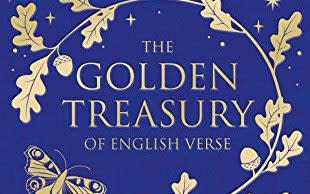Culture fix: Palgrave's Golden Treasury
- Oops!Something went wrong.Please try again later.

I suppose purists rather turn their noses up at poetry anthologies, disapproving of the miscellaneous chocolate-box principle of selection. It’s more rigorous, of course, to read the oeuvre of one writer self-curated in a slim volume. But just as there are few composers whose music one would choose to hear throughout a whole evening’s concert, sometimes I prefer the tasting menu of the anthology, with its contrasting moods, rhythms and idioms.
The classic of this genre is Palgrave’s Golden Treasury; as a child, I owned a copy of this perennial bestseller inherited from my grandmother, printed on bible-thin rice paper in a dark blue leather binding tooled with gold curlicues. First published in 1861 and edited by the Oxford don Francis Palgrave with input from his friend Tennyson (to whom it was dedicated), it has been regularly revised and reissued, always with a focus on short lyrics rather than narrative or devotional verse.
Organised chronologically, it is noticeably devoid of the coyly sentimental section headings (‘Friendship’ , ‘Flowers’ and so forth) that mark so many inferior examples of its kind.
Palgrave’s claim to include ‘none but the best’ was based on sound judgment rather than accepted reputation, and the treasury is full of the quirkily unexpected as well as the obvious Shakespeare’s sonnets and Keats’s Odes. Palgrave also had an excellent eye for the good Anon poem – No 106, The Forsaken Bride’ being a very good example
O waly waly but love be bonny
A little time while it is new;
But when tis auld, it waxeth cauld
And fades awa’ like morning dew
It all makes for perfect bedside reading – a poem every night before lights out.
In Palgrave’s wake, modern anthologies such as Helen Gardner’s New Oxford Book of English Verse and Seamus Heaney and Ted Hughes’s The Rattle Bag have also established a firm place in poetry lovers’ hearts. A strong new entrant to the field is The Magic Hour, edited by Charlotte Moore (published by Short Books at £12.99). Based on her Tuesday afternoon reading group sessions, it contains a hundred poems accompanied by simple commentary, Moore’s aim is to take any whiff of the classroom out of the appreciation of poetry, and she succeeds – springing, like Palgrave, delightful surprises (Charles Causley’s ‘Eden Rock’, Ralph Hodgson’s ‘Eve’) as well as reminding us of old friends. It would make a super Christmas present.
